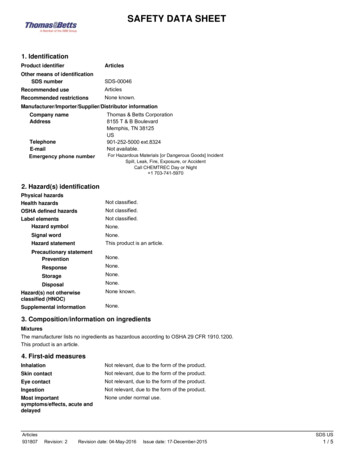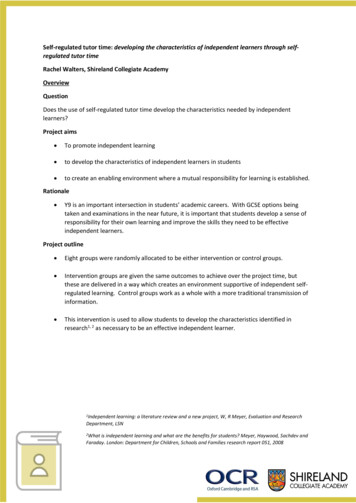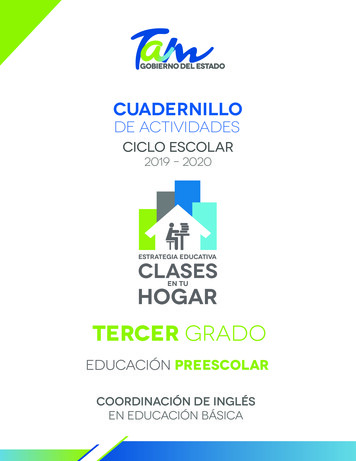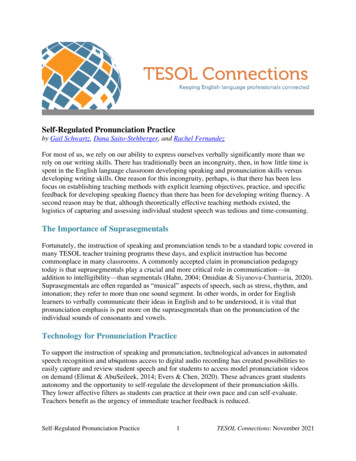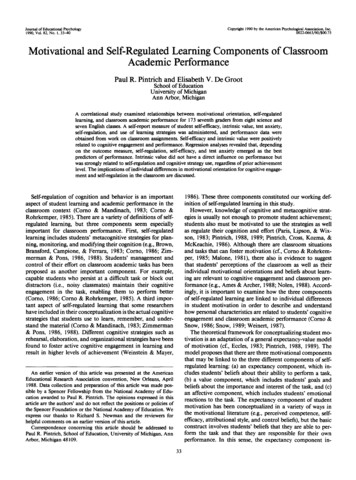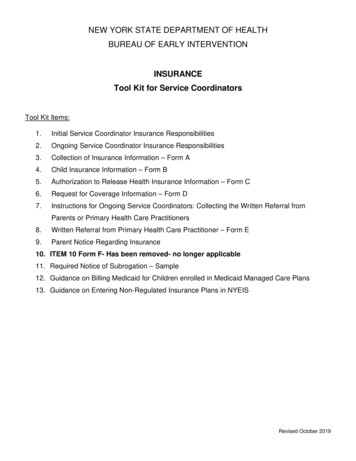
Transcription
Regulated activity inrelation to children:scopeFactual note by HM Government
ContentsIntroduction3Summary3Full description of scope4Part 1: Regulated Activity for children – Activities4Part 2: Regulated Activity in relation to Children – Establishments82
IntroductionRegulated activity is work that a barred person must not do. This note providesinformation on the scope of Regulated Activity in relation to children, defined in theSafeguarding Vulnerable Groups (SVG) Act 2006 and the Safeguarding VulnerableGroups (Northern Ireland) Order 2007, both as amended (in particular by, respectively,section 64 and Schedule 7, Protection of Freedoms Act 2012). This note is about the lawin England and Wales, and in Northern Ireland.This note comprises a short summary, and a full description.Regulated activity still excludes family arrangements; and personal, non-commercialarrangements.SummaryThe new definition of regulated activity (i.e. work that a barred person must not do) inrelation to children comprises, in summary:i.ii.unsupervised activities: teach, train, instruct, care for or supervise children, orprovide advice/ guidance on well-being, or drive a vehicle only for children;work for a limited range of establishments (‘specified places’), with opportunity forcontact: e.g. schools, children’s homes, childcare premises. Not work bysupervised volunteers;Work under (i) or (ii) is regulated activity only if done regularly: “regularly” is defined indetail on the following pages under items (a) to (f).HM Government is publishing statutory guidance on supervision of activity that would beregulated activity if unsupervised.iii.iv.relevant personal care, e.g. washing or dressing; or health care by or supervisedby a professional;registered childminding; and foster-carers.A full detailed description of the above scope follows below.3
Full description of scopePart 1: Regulated Activity for children – ActivitiesThe activities in the left-hand column are regulated activity in relation to children, subjectto: exceptions in the right-hand column;different provisions for “establishments” (specified places) in Part 2 below.Do not read the left-hand column in isolation from the right-hand column or from Part 2.In the right-hand column: “new” exceptions are those in the 2012 Act;“existing” exceptions are already in the 2006 Act or 2007 Order as amendedbefore the 2012 Act, or in secondary legislation under it.ActivityExceptions – not Regulated ActivityAll of regulated activity.Activity by a person in a group assisting oracting on behalf of, or under direction of,another person engaging in regulated activityin relation to children. This is the “peerexemption”.In para 2(1) of Schedule 4 1:(a) Teaching, training or instruction ofchildren, carried out by the same personfrequently (once a week or more often), or on4 or more days in a 30-day period, orovernight*.New:Day to day management or supervision on aregular basis of a person providing thisactivity which would be regulated ifunsupervised. Para 1(15 2).Existing: Activity relating to a child in the course ofhis employment, not by a person forwhom arrangements exist principally forthat purpose.*Sources: once a week: guidance, March 2010,Annex B, page 70 para B.12; four or more days/ overnight: Schedule4, para 10(1) as amended. Supervised activity - under reasonableday to day supervision by another personengaging in regulated activity. Para2(3A) Activity merely incidental to activity withadults.1References to “Schedule 4” should be read as “Schedule 2” in the Safeguarding Vulnerable Groups(Northern Ireland) Order 2007 (SVG Order).2Para 1(13) in the SVG Order.4
ActivityExceptions – not Regulated Activity(b) Care or supervision of children if carried New:out by the same person frequently (once a Supervised activity - under reasonableweek or more often), or on 4 or more days inday to day supervision by another persona 30-day period or overnight.engaging in regulated activity. Para2(3B)(b). See rows (i) to (iii) below re types ofcare.Existing: Activity relating to a child in course of hisemployment, not by person for whomDay to day management or supervision on aarrangements exist principally for thatregular basis of a person providing thispurpose.activity which would be regulated ifunsupervised. Activity merely incidental to activity withadults.Particular types of care within (b) above,which apply to any child, even if done onlyonce: (i) to (ii) below.(i) Relevant personal care. Para 1(1B):(a) physical help in connection with eating ordrinking, for reasons of illness or disability;(b) physical help for reasons of age, illness,or disability, in connection with: (i) toileting (including re menstruation); (ii-iii) washing, bathing, or dressing;(c)-(d) prompting with supervision, in relationto (a)-(b), where the child is otherwise unableto decide;(e)-(f) other training or advice in relation to(a)-(b).(ii) Health care. Para 1(1C):All forms of health care relating to physical ormental health including palliative care andprocedures similar to medical or surgicalcare.New:(c) Advice or guidance provided wholly ormainly for children relating to their physical,emotional or educational well-being if carriedout by the same person frequently (once aweek or more often), or on 4 or more days ina 30-day period or overnight.New:5 Health care not by, or directed orsupervised by, a health careprofessional*. Para 2(3B)(a).*Defined by reference to regulatory bodies.Para 1(1C). Legal advice. Para 2(3C);Existing: Activity relating to a child in course of hisemployment, not by person for whomarrangements exist principally for thatpurpose.
ActivityExceptions – not Regulated Activity(a), (b) & (c): Definition of “overnight”:In relation to teaching, training or instruction;care or supervision; or advice or guidance, itis also regulated activity if carried out (evenonce) at any time between 2am and 6am andwith an opportunity for face-to-face contactwith children. Schedule 4, Para 10(2).Former category (d), treatment or therapy, isnow replaced by “health care” provisions.(e) Moderating a public electronicinteractive communication service likely to beused wholly or mainly by children, carried outby the same person frequently (once a weekor more often), or on 4 or more days in a 30day period.Existing: Activity by a person who does not haveaccess to the content of the matter, orcontact with users.(f)Driving a vehicle being used only forconveying children and carers or supervisorsunder arrangements as prescribed*, carriedout by the same person frequently (once aweek or more often), or on 4 or more days ina 30-day period. *Prescribed by SI 20091548 3.In para 1 of schedule 4:(3) Early years or later years childminding*with a requirement to register, or voluntaryregistration, under Childcare Act 2006 4.*That is: on domestic premises, for reward;as opposed to “childcare premises”, part 2below.Existing:(5) Fostering** a child. Care arranged by family members andnot for reward is not regulated activity.Section 53(8) 6.**Defined at section 53 5. Local Authority can foster child withbarred person who is, or lives with, arelative of the child. SI 2009-1797, Art3(2).3In Northern Ireland: Statutory Rule S.R. 2009/306.In Northern Ireland: requirement to register is provided for under Children (Northern Ireland) Order 1995.5In Northern Ireland: Article 55, SVG Order 2007.6In Northern Ireland: family or personal relationships are exempt under Article 3, SVG Order 2007.46
ActivityExceptions – not Regulated Activity(6) & (9) to (13)***: Wales only: child minding with requirement to registerunder Children Act 1989 includingactivities that require registration if childunder eight; functions of Children’s Commissioner forWales and deputy; inspection functions in relation toeducation, training, childcare andchildren’s health or social care.***In Northern Ireland: (6), (6A), (7A) & (8): Guardians Ad Litem; Controllers appointed under MentalHealth (NI) Order 1986; Inspection/ Registration functions ineducation, training, juvenile justice,childcare, and children’s health or socialcare.(14) 7 Day to day management on a regularbasis of a person providing a regulatedactivity in Schedule 4, paragraphs 1(1) or (2)– that is, activity: at (a) to (f) above;or in establishments in part 2 below;and (9C) or (11) in Wales only.7In Northern Ireland: Para 12 of Schedule 2 in SVG Order 2007.7
Part 2: Regulated Activity in relation to Children –EstablishmentsAn activity is regulated activity in relation to children if carried out (subject to exceptionsbelow): in one of the following establishments;frequently (once a week or more often), or on 4 or more days in a 30-day period;by the same person, engaged in work for or in connection with the purposes of theestablishment; andit gives the person the opportunity, in their work, to have contact with children.Day to management or supervision on a regular basis of a person providing the aboveregulated activity for children is regulated activity for children.EstablishmentExceptions – not Regulated ActivitySchedule 4, para 3(1):(a) schools (all or mainly full-time, forchildren);(aa) pupil referral units (also known as ShortStay Schools) not falling within the above;(b) nursery schools;(d) institutions for the detention of children;(e) & (f) children’s homes;(fa) children’s centres in England;(g) childcare premises (including nurseries).New: Activity by person contracted (orvolunteering) to provide occasional ortemporary services (not teaching,training or supervision of children). Para1(2A) & (2B)(a); Volunteering, under day to daysupervision of another person engagingin regulated activity. Para 1 (2B)(b).Existing: Activity by a person in a group assistingor acting on behalf of, or under directionof another person engaging in regulatedactivity;Day to day management or supervision on aregular basis of a volunteer activity whichwould be regulated if unsupervised. Para1(15). childcare premises which are the homeof a parent etc. of at least one child towhom the childcare or child minding isprovided;In Northern Ireland (under Schedule 2, Para3(1) of the SVG Order): for activity undertaken regularly in anumber of different establishments, butonly infrequently in each: eachestablishment is only arranging theactivity infrequently, so eachestablishment is not a regulated activityprovider in relation to that activity.(a) schools (all or mainly full-time, forchildren);(b) nursery schools;(bb) Alternative Education Provision;(c) a children’s hospital;(d) institutions for the detention of children;(e) children’s homes;(f) childcare premises.8
EstablishmentExceptions – not Regulated ActivityIn Northern Ireland: day to day managementor supervision on a regular basis of avolunteer activity which would be regulated ifunsupervised. Para 1(13).Note: Categories for office holders (“Positions” - Para 1(9) and Para 4) and forInspectorates in England (sub-paragraphs of Para 1) are removed. In Northern Ireland,categories for office holders (“Positions” – Para 1(7) and Para 4) are removed.9
Crown copyright 2012This publication (not including logos) is licensed under the terms of the OpenGovernment Licence v3.0 except where otherwise stated. Where we have identified anythird party copyright information you will need to obtain permission from the copyrightholders concerned.To view this ves.gsi.gov.ukwrite to Information Policy Team, The National Archives, Kew, London, TW9 4DUAbout this publication:enquiries www.education.gov.uk/contactusdownload 201-2012Follow us on Twitter:@educationgovukLike us on Facebook:facebook.com/educationgovuk10
This note comprises a short summary, and a full description. Regulated activity still excludes family arrangements; and personal, non-commercial arrangements. Summary The new definition of regulated activity (i.e. work that a barred person must not do) in relation to children comprises, in summary: i.
